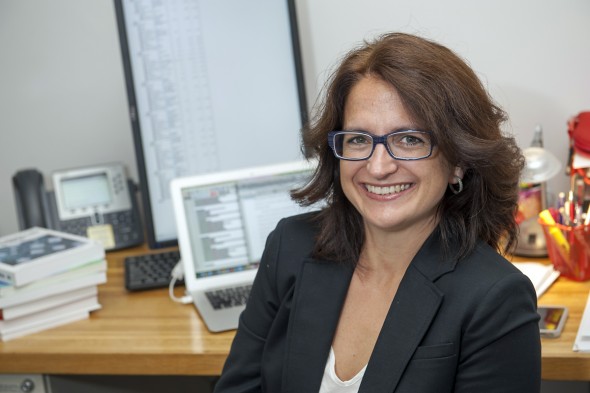Eulalia Puig Abril asks: Are you sending the right messages?

Eulalia Puig Abril is studying an app to help people quit smoking. “There’s something about sharing experience that makes people feel better,” says Abril, assistant professor of communication. Photo: Roberta Dupuis-Devlin/UIC Photo Services (click on image for larger file size)
Eulalia Puig Abril gets around — she’s lived or studied on every continent except Antarctica.
Her latest trip abroad was last year, to Senegal in western Africa. An assistant professor of communication, she was there to work on a project to prevent cervical cancer.
“We were trying to discover a persuasive route” to get women screened for the disease, she said.
“If someone you know — your husband, an elder, a village chief — says, ‘You need to exercise more,’ for example, you’re more likely to do it. We had to find sources of influence.”
Senegal has universal health coverage, but doesn’t offer screening for cervical cancer.
“I worked with a group of doctors who were attempting to fill that gap,” Abril said.
She’s now involved in two projects to help quit smoking.
The first is an app that directs the user through a progressive program. Day One has two smoke-free hours. Day Two has no restrictions. Day Three has four smoke-free hours, Day Four has no restrictions, and so on until you’re not smoking anymore.
The app sends congratulatory messages such as “Good job!” Essential to the program is sending messages to let others know how you’re doing — “Day Three was hardest,” “I did it and now I’m smoke-free!”
“There’s something about sharing experience that makes people feel better,” Abril said.
“My research is on how the tweets exchanged are experienced by users and supporters to improve the likelihood of quitting.”
She’s collecting data through Twitter from Spain, where she was born.
The other project, in collaboration with UIC’s Institute for Health Research and Policy, rounds up social media messages on smoking cessation from Twitter, Facebook, YouTube and Tumblr.
“One of the things I’m looking at is tips from former smokers,” Abril said, such as the shocking TV spot with “the lady with the hole in her neck.”
These messages scare people, but do they react by stopping smoking or by smoking more?
“Sometimes when you tell someone ‘Don’t do something,’ like telling a teenager not to do drugs, he’ll do the opposite because you’re threatening his freedom,” Abril noted.
So the tips don’t say “don’t.” They just present the facts.
“Our results showed that it was more effective,” she said.
Abril wasn’t always in communications. Her bachelor’s and two master’s degrees are in economics.
After she earned her bachelor’s she was a consultant in economics on a land use project for the World Bank.
“The job wasn’t personally satisfying and I wanted to teach and remain in the social sciences,” Abril said.
So when she went for a Ph.D., which she completed two years ago, she switched to communications.
Her dissertation was about what happens when people get their news from a source that is either balanced or partisan.
“I designed an experiment in which one group got its news from one kind of source and a second group from the other kind,” Abril said.
Then she asked participants a series of questions: How likely are you to engage in discussion of the news topic? Would you withdraw from a discussion? Would you say nothing? Would you conform to what you perceive the majority agrees on?
“People exposed to balanced news, which is prevalent in the print media, were less likely to engage in discussion,” Abril discovered.
“With partisan sources, everyone agrees so you’re more sure about your position. With two sides expressed, you might come out thinking you don’t know which side should prevail.”
Her study was in this country and Spain, “where participants have traditionally been exposed to balanced and partisan news, respectively.”
When Abril thinks about all the places she’s lived, she can’t choose a favorite — “They all have their advantages and disadvantages,” she said.
Denmark, for example, “was cold, but the people were happy.”
She added, “In Australia, it felt far away from everything. I didn’t know anyone. But it was the same in the U.S., and I met people. I can’t explain it.”
Abril was raised in Catalonia, a region of Spain. Sixth graders in Spain are taught either English or French, depending on the school. She learned English.
She earned a bachelor’s degree from the Autonomous University of Barcelona, a master’s degree from the University of Copenhagen, and a second master’s and Ph.D. from the University of Wisconsin-Madison.
Abril lives in Chicago with her husband, Scott, a web developer in the College of Liberal Arts and Sciences. Their kids have Catalan names — Xantal, 6, and Ulric, 2.
By the way, her first name, Eulalia, is pronounced not yoo-LAY-lee-a, as you might suspect, but oh-LOLLY-a. Friends call her Lali.
